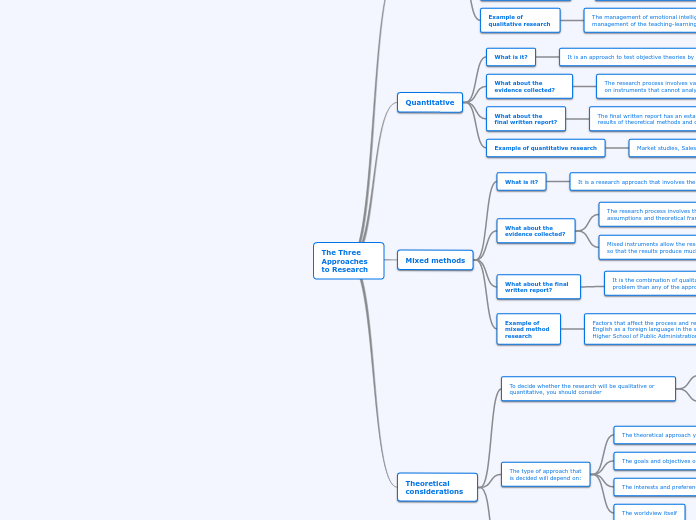The Three Approaches to Research
Qualitative
What is it?
It is an approach to explore and understand the meaning that individuals or groups attribute to a social or human problem. The research process involves emerging questions and procedures.
How about the evidence collected?
The data is collected, analyzed and used to build from details to general topics and research or interpretation of the meaning of the data.
Sample data: interviews, observation, groups, narratives, etc.
What about the final written report?
The final written report has a flexible structure. This type of research has a style focus on individual meaning and the importance of representing the complexity of a situation.
Example of qualitative research
The management of emotional intelligence as a distinctive competence in online teaching to improve the management of the teaching-learning process in the field of social sciences. By Dr. María Luisa Vercher Ferrándiz
Quantitative
What is it?
It is an approach to test objective theories by examining the relationship between variables.
What about the evidence collected?
The research process involves variables, which can typically be measured on instruments that cannot analyze data using statistical procedures.
Example of variables: age, gender, social stratum, ect.
What about the final written report?
The final written report has an established structure consisting of introductory literature, results of theoretical methods and discussion as qualitative researchers.
Example of quantitative research
Market studies, Sales analysis, etc.
Mixed methods
What is it?
It is a research approach that involves the collection of quantitative and qualitative data.
What about the evidence collected?
The research process involves the integration of the two forms of data and using different designs that may involve philosophical assumptions and theoretical frameworks.
Mixed instruments allow the researcher to combine questions so that the results produce much more efficient responses
Example of evidences: questionnaires that include open questions, interviews, observations, etc
What about the final written report?
It is the combination of qualitative and quantitative approaches, which provides a more complete understanding of a research problem than any of the approaches alone, and that their definitions have considerable information in each of them.
Example of mixed method research
Factors that affect the process and result of learning English as a foreign language in the students of the Higher School of Public Administration of Cúcuta, by me.
Emerging the need to apply surveys to the students of the institution, then the data of the first methodology is processed obtaining the detailed information through interviews of a sample of the population of the institution to be treated, complementing the information in a related way.
Theoretical considerations
To decide whether the research will be qualitative or quantitative, you should consider
How you will gather the evidence
When and why gather appropriate evidence
The type of approach that is decided will depend on:
The theoretical approach you are taking to investigate
The goals and objectives of the project
The interests and preferences
The worldview itself
False myths
Qualitative research is easier than quantitative research
The claim is denied because: Qualitative research consumes more time than quantitative research, because it involves detailed analysis and rigorous interview data or any material collected.
Qualitative research is less scientific or will not be published as easy as quantitative research
The claim is denied because: When the area to be developed is new, the development of research could be based on a more inductive theory, using a qualitative approach. In this way, it seeks to test an existing theory, developing and building a new theory. Thus being more appropriate and scientific.
